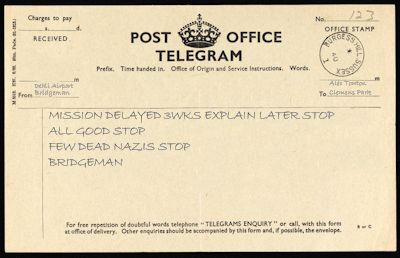
Clues and Puppets |
As the fog cleared around the DC3, the passengers and crew found themselves flying over India, and after a few minutes with the instruments the crew declared that they were an hour from their original destination, Safdarjung Airport. They radioed ahead for a landing slot in the usual way, to be met with a disbelieving and incredulous response. They were, of course, arriving after 19 days instead of a six-hour flight...
As the plane rolled to a halt on the grass of the apron it was already surrounded by vehicles; KLM ones, RAF ones, Imperial Indian Police ones and medical ones. The Fire Service and their fifty-year-old fire engine were sulking unneeded at the edge in maginficent polished brass dudgeon. As the occupants of the plane disembarked, they were politely but firmly guided to cars and driven directly to the airport buildings. This, on top of his 'abduction' by Tsering Lama, was stoking Joe Vandeleur's anger, and he was becoming increasingly uncooperative. Finally, he demanded to have a telegram sent to Clemens Park immediately. Taking the pencil and paper, he wrote hastily:

The agents were parked in some reasonably comfortable billets, in spite of several protests, and left there to wait. Coffee, tea and food were available and the opportunity to get cleaned up and change. Two burly MPs on the door ensured that the agents stayed put; these eyed the Bren gun Joe still had with him with deep disquiet. The flight crew, nowhere to be seen, were presumably being interviewed elsewhere.
The climate, especially after the Tibetan mountains, was thick and muggy. The old India hands knew that the monsoon was just around the corner, though it had not yet broken.
Three hours later, a polite but firm MP came and collected them, guiding them to an interview room. A panel of three men sat across a table from them, but the initial air was not hostile - there were chairs for them all, for a start. Once seated, the central figure spoke up.
"Good afternoon, all. My name is Group Captain Max Davidson, commanding RAF here at Safdarjung; this is Gerald Baxenby, KLM's top man here, and this is Superintendant David Purcell of the Imperial Indian Police, responsible for Airport Security. We're trying to get to the bottom of what is going on here; please will you tell us in your own words what happened?"
The initial responses were not very diplomatic; "No," and "We flew here from Calcutta" were a sample. Joe folded his arms. "Our mission is top secret, sir, and we are unable to discuss it. Please refer to Section M HQ, Viscount Towton; I believe there's a local representative - one Lt Arthur Tenison - here in the city also." He then tried to browbeat the Crp Cpt into letting them go, and was told to "sit down, and shut up, soldier!"
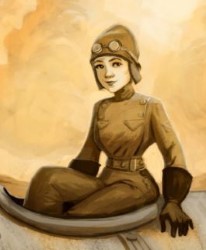 |
At this point Francoise staged a splendid performance of a helpless woman breaking down in tears, which despite her 6'+ height worked splendidly; Davidson was a product of his time and culture and rapidly organized some WAAFs to collect the Anné and Francoise and "take them somewhere to settle them down".
The debriefing didn't really get any further after that, and after assuring them that Joe's telegram would be followed up for confirmation, the MPs were summoned to return the agents to the waiting room
As the rest of the investigators were leaving, Birapeer - dressed now in his best RAF blues - saluted and asked the Group Captain if he might have a private word. Davidson agreed, and the Sikh spoke quietly to him, explaining that he had no intention of divulging their mission without permission from Clemens Park, but that it had the potential to significantly shorten the war. His far more reasonable approach was clearly a relief to the officer, who agreed to seek clarification from England as quickly as possible and thanked Birapeer for his assistance. Nodding after the vanished agents, he finished quietly, "see if you can keep them calm, please, Pilot Officer?" Birapeer smiled internally, quite aware that the fuming Joe and his Bren were the likely object of this request, saluted again and followed his colleagues.
Returning to the billet, he found that Joe had occupied his time filling out requisition forms for replacement ammunition and explosives; perhaps not an ideal move to convince their interviewers that they were reliable, stable and genuine! It was something to do, though, and eventually the tank officer managed to get the forms routed via the RAF to Army HQ. It would probably take the arrival of orders assiging them there before anything came of it, but it was a start.
Three hours later, the MPs came back, and escorted the agents back to the briefing room. Only Davidson and Purcell were present, and the whole atmosphere was significantly warmer. The Group Captain told them that confirmation had indeed come back from Clemens Park, and that they were free to go; he apologized for their inconvenience. "We still have a lot to explain," he said, "not least a plane whose crew say they were forced down by engine failure and made field repairs, but which has no sign of either and more fuel loaded than when it took off." The agents tried to put in a good word for the KLM aircrew, who had done their bit in Tibet after all.
Ten minutes later, the agents found themselves outside the Airport gates, with directions to Army HQ and Lt Tenison's office.
 Keeper Note: Keeper Note: Maha-what? In the Mahabharata, the five Pandava brothers, including Arjuna, lose both their kingdom and their wife (Draupadi) in a game of chance with the Kauravas. The brothers are then forced to wander India for thirteen years. During the battle at Kurukshetra, Krishna acts as Arjuna’s charioteer and delivers a sermon on duty and responsibility that goes on to become known as the Bhagavad Gita. After much struggle, the Pandavas defeat the Kauravas and reclaim their homelands and their wife. |
As the investigators made their way from the airport to the Police Court, they noticed that the streets seem to be unusually busy. Large numbers of children were streaming in one direction, laughing and shoving each other in a state of high excitement. It became increasingly difficult to navigate through the pint-sized throng, and the agents found themselves swept along with it, along with most other adults in the street.
.jpg) |
The children’s destination soon became clear. At the edge of the gardens belonging to the Prince of Wales Museum, close to the Wellington Fountain, a puppet stage had been erected and brightly painted marionettes could be seen dancing about, much to the delight of the increasingly large congregation. This was not a normal occurrence; puppet shows were usually only performed during festivals or on holy days and, according to Birapeer and Joe, today was neither.
Birapeer and Marcus explained to the others that this appeared to be a performance of part of the Mahabharata, the epic story of the rivalry between the five Pandava brothers and a hundred members of the Kaurava clan. It appeared that the puppets were enacting the final battle at Kurukshetra and, as the investigators watched, one of the puppets brandished a weapon he loudly claimed to be “born from fire” (the literal translation of the word “Agneya”).
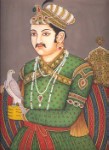 Keeper Note: Keeper Note: The Nine Jewels Despite being illiterate (having been raised expressly as a warrior), Akbar The Great (Moghal Emperor 1556-1605), greatly prized knowledge and the arts and employed nine men from different professions to give him counsel. Although accounts of just who the nine were vary, several names do feature on most lists. First among them was Tansen, a musician, composer, and singer, who was said to be able to charm the birds and beasts, as well as possessing the ability to alter the weather and to light lamps with nothing but the power of his song. Then there were the brothers Abul Fazl (Akbar’s vizier and official historian) and Faizi (poet, scholar, compiler of political reports, and translator of Indian epics), the warriors Raja Man Singh and Raja Todar Mal (also Akbar’s finance minister and statistician), and the witty and urbane Birbal (one of Akbar’s closest confidantes). 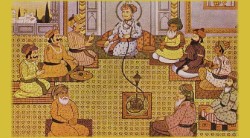 |
With a bang of firecrackers and a plume of smoke, the puppet discharged the weapon and everything in front of it disappeared in a blinding flash of light, accompanied by loud whoops of joy from the watching children (although one or two of the smaller ones did start to cry).
Oddly, the story did not continue with the rest of the battle as it should have. New marionettes appeared, dressed as members of the Moghal court. There were nine of them, and each had a prominent (but obviously fake) precious stone set into his turban. One was singing a haunting melody, a tune that defiantly sticks in the mind; Birapeer, Marcus and Joe all knew instinctively that there was something deeply important about it, but they could not say why.
The singing puppet announced that he was Tansen, the leader of the “Nine Jewels” and that they had been searching for relics from India’s mythic past to help their master, Akbar the Great. Another of the puppets pointed to the weapon, now abandoned on the stage floor. This marionette announced that he was Raja Man Singh and that he recognised Tvastr’s work when he saw it. Even though such a legendary weapon might have been useful to the Emperor during such times, it was too dangerous for mortals to possess.
A third puppet, who identified himself as Birbal, suggested that they should give the holy weapon to Lord Shiva so that no-one would be tempted to use it again.
All the puppets agreed, and set off on a journey to what the investigators recognised as Mount Kailash, near Lake Manransovar in Tibet - where they had just come from!
 |
There, the marionettes, all singing the strange tune first sung by Tansen, handed the weapon over to Shiva and his consort Parvati. Nandi (the bull who acts as Shiva’s vahana, or mount), always at his master’s side, rolled what appeared to be a ball of some sort backwards and forwards with his nose in a most uncharacteristic display of playfulness, making the spellbound children giggle all the louder.
As soon as Shiva accepted the weapon, the action switched back to the rest of the Mahabharata and, a couple of hours later, the show ended and the crowds dispersed.
The agents exchanged glances. Somehow, whatever forces were at work in the world had delivered this seemingly coincidental experience that seemed to have strong references to the task they were engaged in. After a few words, they split up to investigate.
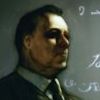 |
Cyril wandered through the crowd, talking to people - in English, his study of Indian languages having been rather unsuccessful. Most Indians, especially here in Dehli, spoke some English, and he was able to ask several whether this story was always performed this way. "Oh, yes, indeed, sahib; this is the story. Wasn't it good? I enjoy this show. Did you like it?"
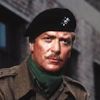 |
Joe worked his way around behind the box of the puppet show and found the main puppeteer recieving congratulations from a few other members of the audience. When his turn came, he introduced himself as an amateur student of local folklore, interested in the local culture. The puppeteer was only too willing to be helpful. He was well aware that the story he performed was unusual compared to anyone else’s, but it had always been done that way; handed down from father to son for as long as anyone could remember. As to the date, his answer was simple: this was when the puppet show should be performed according to his family’s tradition. That it happened to be on the same day that the investigators were passing and had some special interest for them was obviously kharma.
 |
Marcus had, while the show was in progress, quietly made the Voorish Sign out of sight. He had been looking for some untoward forces at work, but what he saw was the flows of emotional energy such a skilled performance could evoke; the threads of the performer's skill, woven with the shared experience of the audience and their feelings. Here and there he saw a spark of brighter energy where a guru or a holy man was part of the crowd, but generally speaking, there was nothing exceptional to be seen,
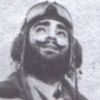 |
Birapeer had woven his way into the crowd itself, locating and respectfully speaking to those holy men and priests that he could reach as the audience dispersed. The first one he encountered turned out - like himself - to be a stranger in this part of the city, but the next was a local. As had the others, he found satisfaction with the show, and a complete confidence that this was how the story was meant to be.
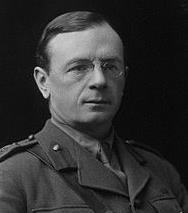 |
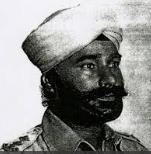 |
On arrival at the Police Court, the agents were met promptly by Arthur Tenison, a classic Englishman of India. He guided them through the building to a classroom within the barracks, where a tall Indian gentleman in military uniform was sitting perched on the edge of the desk. He stood when the investigators entered and introduced himself as Subedar Indrajit Joshi, KCIO, of the Bombay Grenadiers. He made sure to shake everyone’s hand before asking them to be seated.
Tenison and Joshi had read the reports from the debriefings after the Italian and Egyptian missions – and said so - but wanted to hear for themselves what they had to say. To begin with, made wary about their experience at the airport, the agents were cagey; however, when it became apparent that both these two were at least partially "in the know", the agents opened up and related some of their adventures.
That completed, Joshi began to explain why he had asked to meet them. He was deeply concerned that, according to the most recent reports to cross his desk, a rogue group was actively searching for something - some kind of weapon, maybe ancient - which could cause carnage, or, worse, serve as some sort of ancient mystical rallying point for the disaffected. At this point he paused, and asked; "What - if anything - do you know about The Brides of Durga?"
The agents blinked at each other but - other than some basic knowledge of Durga herself from Cyril and Marcus - came back with nothing. Joshi explained that this was a name he had been picking up in rumours attached to an Indian nationalist group. Some unsubstantiated information had the membership described as partly female; though this might be a ruse to throw off those trying to track them down. The grapevine had them as an up-and-coming terrorist organization who were recieving foreign - European - support, possibly German.
Efforts to locate and infiltrate the Brides had so far proven unsuccessful ("What happened to those you sent?" asked Birapeer. "Death," answered Joshi flatly), but their reputation was growing (for one reason or another) amongst the Nationalist underground because of their claims of daring plans to strike a telling blow against the Raj with 'the weapon'.
Several of the other Nationalist groups appeared to think that there was no actual weapon and that the Brides were frustrated crackpots attempting to use ancient myths and symbols to validate their cause; others suspected that they may well have access to armaments, but were using these fanciful stories to shield where they are really coming in from.
Regardless, the British authorities saw the group as being a genuine threat. Not all crackpots are harmless; they can be just as dangerous as the sane, perhaps even more so. And if there really were munitions hidden in the caves beyond Aurangabad, ancient or not, someone was going to try and retrieve them no matter where they may have come from, and that could only be a bad thing for the Raj’s safety and security during these turbulent times.
 |
Whatever the real reason, Ellora was undoubtedly the place that the Brides were focussed on, and the investigators’ arrival could not have been more perfectly timed. Joshi had been given the authority to offer the services of the Bombay Grenadiers to the investigators, including the use of vehicles to get them to the caves and men to help support them against whatever they might find there. He realised this was an unusual situation and was frank in admitting that he would greatly appreciate any assistance they could offer to him and his men.
The caves at Ellora lie approximately 220 miles to the northeast of Bombay and 19 miles to the northwest of Aurangabad, the City of Gates, named after both the Moghal Emperor Aurangzeb and the numerous entrances to the city. The roads between Bombay and Ellora are, like most of those in India, little more than cart tracks, but the Army has some sturdy Bedford trucks available in which to make the journey.
The train journey from Dehli to Aurangabad is roughly 400 miles, and takes a little over a day.
After some more discussion, the agents agreed to work with Tenison and Joshi - their objectives did seem extremely well aligned - but asked for a few days to re-equip and prepare. Tenison and Joshi were comfortable with that - it would take a similar period to muster Joshi's men and arrange the trucks and so forth. Marcus asked for directions to the local library, and some good hotels, which the two were pleased to provide.
Birapeer and Joe furnished descriptions of the group's old acquaintances Weisemann and Gomez. "They may be here; you have to assume the worst when working with these guys," said Birapeer. "If your people encounter them, don't talk to them, don't observe them, don't try and capture them. Kill them on sight."
 Keeper Note: Most RPG parties have a concept, goal, hatred or experience that binds them in fellowship and co-operation. Bizarrely, for this party, it seems to be cricket; nothing - even being shot at - gets them working together better than cricket! Keeper Note: Most RPG parties have a concept, goal, hatred or experience that binds them in fellowship and co-operation. Bizarrely, for this party, it seems to be cricket; nothing - even being shot at - gets them working together better than cricket! |
As the meeting broke up, Joshi's face broke into a broad smile. "Cricket in the ruins, eh?" he said with a chuckle. "I'd like to have seen that!" Tenison's face lit up and he gestured animatedly with the pipe he carried but never seemed to smoke. "I'll say," he said eagerly. "I bet the ball don't bounce much on sand, eh?" It became rapidly apparent that both men, as well as colleauges and friends, were cricket aficionados. Any reserve in the relationship suddenly disappeared as most of the agents joined enthusiastically in the cricket talk, culminating in an agreement to join in the Officers vs Enlisted match planned for the Thursday - this being Friday.
Parting with warm regard from the two 'locals', the investigators headed off to do some research and to catch up with their studies, both mundane and arcane.
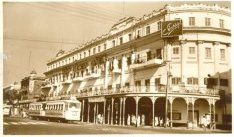 |
For the next few days, the agents split into several groups.
Joe and Marcus spread various of their tomes out on the tables they had brought into their hotel room. Marcus finally completed studying the blasphemous Cultes des Goules, and his brain reeled from the hideous premise of the conclusion. His judgement was sufficiently compromised that, when Francoise asked to borrow the dark book, he actually passed it to her. Not without a shudder, she began to study the book, recoiling from the hideous accounts of necrophilia and black magic within.
Joe borrowed Marcus' copy of Entering the Silver Gate, the first of the trilogy Marcus had been given by his mentor, the mysteriously-vanished Victor Sells.
Their main study, however, was the translation of The Book of the Machine, and Marcus took the lead in working through the fourth chapter - the one dealing with the artifact Tsering Lama had told them was at Ellora. The description of its capabilities was disturbingly close to what the investigators saw in the puppet show, apart from the smoke and banging noises; the holy man’s notes insisted that the weapon was both smokeless and virtually silent. As mentioned earlier, the book did not recount the item’s actual appearance, although it did hint that it can be wielded by any adult with relative ease.
Calling on Joe to translate from the German on the fly, Marcus cross-referenced with Dr. Ehrlichmann’s notes on the Black Stone, confirming what the lama told them about the weapon’s location. There were detailed sketches of parts of the rock temples at Ellora, including a map of the Kailasanatha Temple, which the journal describes as a representation of Shiva’s home, Mt. Kailash. This news came as something of a relief to the investigators; after the puppet show, they had half feared having to travel all the way back to Tibet to find the artefact.
Other sketches included ones of bulls, which appeared to be carrying balls in their mouths (rather than rolling them around on the floor); there were also images of carved panels of Shiva and Parvati sitting on top of Mt. Kailash. Ehrlichmann included sketchy notes on the construction and history of India’s rock temples as well.
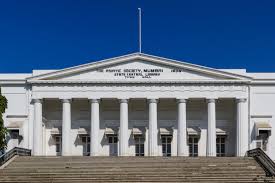 |
Cyril went to the Asiatic Society and plunged into its famous library. A solid day’s reading revealed details on the location of the Ellora caves, the existence of the Kailasanatha Temple, its link to Mt. Kailash, and its most unusual feature of having musical columns (which are usually not found in temples outside the south of the country).
One dusty architectural tome described how several temples in southern India have carved granite columns which produce defined musical notes when tapped; other columns may also emit a tune if someone blows into holes carved into them. The exact reason for this on a spiritual level is uncertain, although music, along with dancing, is used to worship the gods in sacred spaces. A longwinded discourse on the nature of acoustics and resonant frequencies was also included, for those who wished to know. Cyril skipped that bit.
Not suited to the academic research, Birapeer decided to do a little undercover snooping instead; after all, he was uniquely suited to do so! Obtaining some suitable rags, a bowl and a grubby dhoti, the normally fastidious Sikh covered himself in dirt and disordered his beard and moustache, then - wincing slightly - changed his proper turban for that of a poor beggar. Thus prepared, he set off into the streets and began wandering.
He spent several days working his way into the streets in the poorer districts of Dehli, always gravitating towards and agreeing with those he found discontented with or antagonistic to the British Raj. Finally, after several days, he got wind of a place where a friend of a friend's uncle had met some people who could perhaps do something about dislodging the hated Europeans. Following up, he found himself one dark night in a reeking hovel with an assortment of other Indians, all the type of losers and unlucky ones who would be drawn to this sort of thing. No-one was using their real names, it seemed, addressing each other by pseudonyms of one sort or another.
At the front, a middle-aged man, lean and fiery and with a fanatic light in his eyes, was addressing the meeting, whipping anti-British feeling to a fever pitch. Slightly behind him were two more interesting people; a younger woman, wearing the sari of a fairly well-to-do housewife, and a young man, immaculately dressed in a European suit. These two spoke quietly between each other, and watched the meeting, but made no effort to participate.
 |
As the rhetoric built towards a climax, Birapeer slipped out again and hid himself where he could watch the exit. A few minutes later, the meeting broke up, and the rank-and-file hurried away, scattering into the night. Last of all, the man and woman emerged, and from their body language and low, intense voices they were arguing fiercely. Finally, they turned and marched off in opposite directions.
Birapeer was faced with a dilemma, and he had to guess fast; he followed the woman. She hurried through the slums, her cloak pulled close about her, watching carefully to see if she was followed and it took all Birapeer's skill and nerve not to be noticed. As time went on, it became apparent that she was heading for one of the much better-off districts, and finally she went up the steps to a rather plush looking house. The door was opened for her by a servant, and she walked in as if she owned the place - which, Birapeer reflected, she possibly did. He noted the address, then slipped back into the shadows and headed back for a much-anticipated bath and brush up.
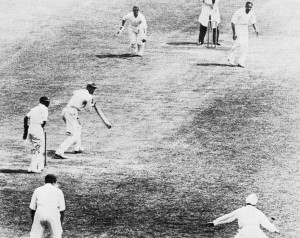 |
Thursday rolled around, and the agents took a break from their various researches for a game of cricket. Apparently the British forces had a regular game between the Officers and the Enlisted Men, and with some imagination the agents added themselves to one or the other team; Joe, Birapeer, Cyril and Marcus on Arthur Tenison's Officers' team and Anné, Jimmy and Francoise on the Enlisted - captained by Suebedar Joshi.
As the sun began to sink, an epic encounter was played out, with great sportsmanship and camaraderie of course. Joe - and strangely Francoise and Jimmy - excelled themselves, Jimmy's youth and Francoise's lightning pilot reflexes standing them in good stead. Birapeer, Cyril and Anné played well and scored runs for their teams. Marcus, still plagued by unexpected flashes of hallucination and considerably older than the others, did not fare so well and soon retired to the pavilion to nurse a cooled pink gin and try and pull his thoughts together.
In the end, the Enlisted team won by a narrow margin, to warm applause from the defeated Officers, and everyone retired for Tea in great spirits.
Session Date: 28th August 2018 |